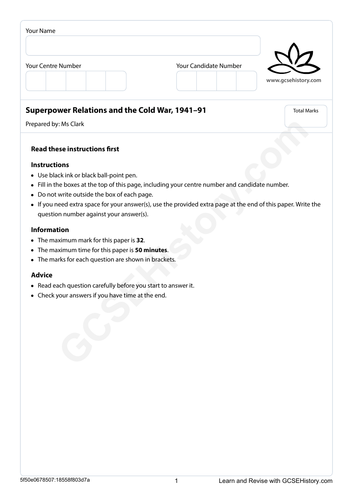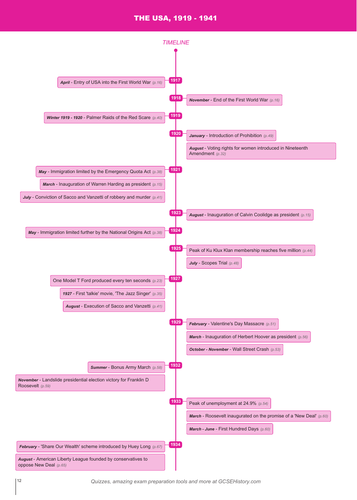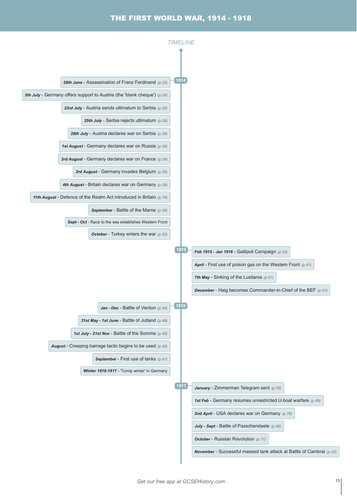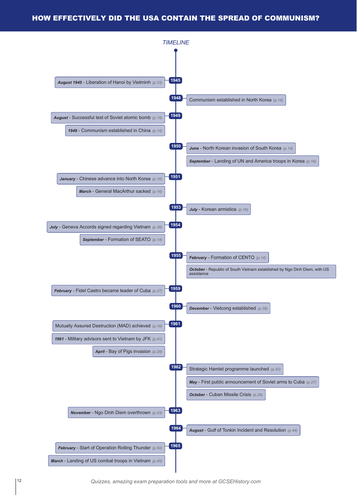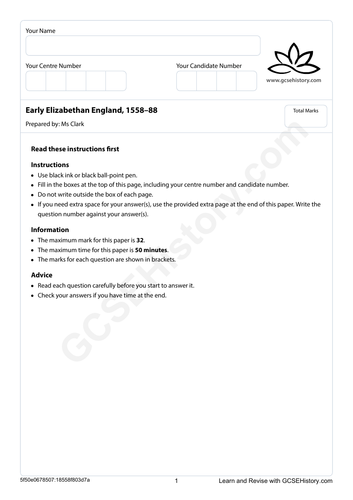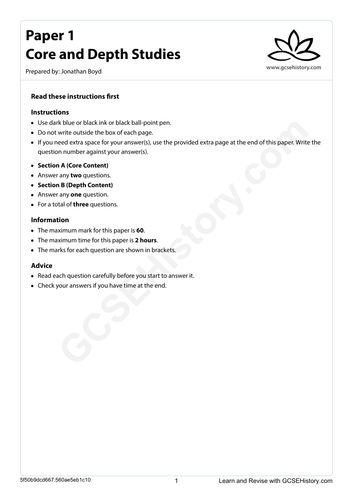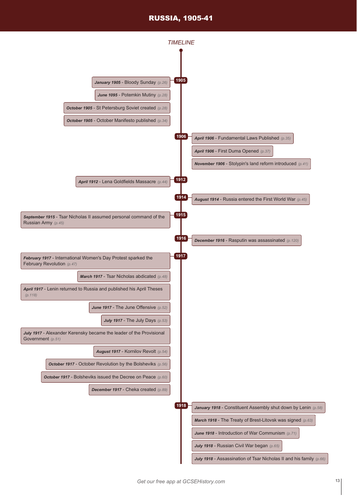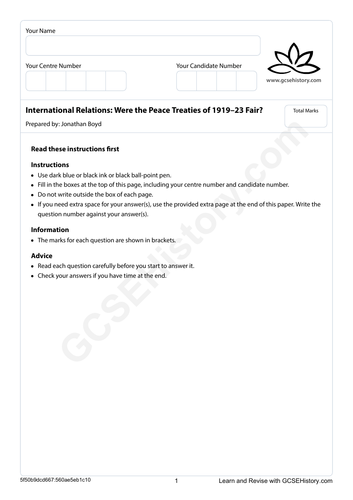112Uploads
39k+Views
16k+Downloads
All resources

Mock Paper - Superpower Relations and the Cold War, 1941–91
You can create a complete mock paper like this one on your chosen Edexcel GCSE unit in one click. Change the questions if you like and download. It’s so fast your mock paper will be ready and printed before your cuppa is ready. [GCSEHistory.com]

Glossary - Edexcel IGCSE China: Conflict, Crisis and Change, 1900–89
This glossary is an extract from from a Study Guide by Clever Lili.[https://www.gcsehistory.com/bookstore/ed_igcse_china_conflict_change_1900_1989.html]
Edexcel GCSE The China: Conflict, Crisis and Change, 1900-89 course investigates the major changes in China during the 20th century. The course focuses on the causes, course and consequences of the crucial events during this period, and you will study the different political, economic and military changes that occurred.

Glossary - CIE International Relations: Why Did Events in the Gulf Matter, c1970 - 2000?
This glossary is an extract from from a Study Guide by Clever Lili.[https://www.gcsehistory.com/bookstore/cie_igcse_international_relations_gulf.html]
The focus question of the seventh unit in the CiE Option B International Relations Core Content is ‘Why did events in the Gulf matter c1970 - 2000?’ This unit investigates the events and regimes of the countries in the region of the Persian Gulf, with a particular focus on Iraq and Iran.

Glossary - AQA Conflict and Tension between East and West, 1945–1972
This glossary is an extract from from a Study Guide by Clever Lili. [https://www.gcsehistory.com/bookstore/aqa_gcse_conflict_45_72.html]
AQA Conflict and Tension between East and West 1945-1972 is a wider world depth study that investigates international relations. The course focuses on the causes and course of the Cold War. It considers why the conflict occurred, as well as how it developed into a global conflict over the following quarter of a century.

Timeline - CIE The United States, 1919 - 1941
This timeline is an extract from from a Study Guide by Clever Lili.[https://www.gcsehistory.com/bookstore/cie_igcse_usa_1919_to_1941.html]

Timeline - Cie The First World War, 1914 - 1918
This timeline is an extract from from a Study Guide by Clever Lili.[https://www.gcsehistory.com/bookstore/cie_igcse_ww1.html]

Timeline - CIE International Relations: How Effectively Did the United States Contain the Spread of
This timeline is an extract from from a Study Guide by Clever Lili.[https://www.gcsehistory.com/bookstore/cie_igcse_international_relations_usa_containment.html]

Mock Paper - Edexcel - Early Elizabethan England, 1558–88
You can create a complete mock paper like this one on your chosen Edexcel GCSE unit in one click. Change the questions if you like and download. It’s so fast your mock paper will be ready and printed before your cuppa is ready. [GCSEHistory.com]

Mock Paper - CIE - Core and Depth Studies
You can create a complete mock paper like this one on your chosen CIE unit in one click. Change the questions if you like and download. It’s so fast your mock paper will be ready and printed before your cuppa is ready. [GCSEHistory.com]

Glossary - Edexcel IGCSE A World Divided: Superpower Relations, 1943–72
This glossary is an extract from from a Study Guide by Clever Lili.[https://www.gcsehistory.com/bookstore/ed_igcse_cold_war.html]
Edexcel IGCSE A world divided: superpower relations, 1943-72 is the period study that investigates the origins of the Cold War, three of the key Cold War Crises and the attempts to ease the tensions of the Cold War. You will study the role key individuals played during the Cold War, as well as how the Cold War impacted specific countries. You will focus on crucial events during this period, and study the different political, economic and military changes that occurred.

Glossary - CIE Russia, 1905 - 1941
This glossary is an extract from from a Study Guide by Clever Lili.[https://www.gcsehistory.com/bookstore/cie_igcse_russia_1905_to_1941.html]
CIE Russia, 1905-41 is the depth study that investigates why and how the tsarist regime collapsed in 1917 and was transformed into a communist dictatorship between 1917 and 1941. You will focus on the crucial events and people of this period, as well as studying the different social, cultural, political, economic, military and religious changes that occurred.

Glossary - CIE The First World War, 1914 - 1918
This glossary is an extract from from a Study Guide by Clever Lili.[https://www.gcsehistory.com/bookstore/cie_igcse_ww1.html]
This CIE unit focuses on the course and key events of the First World War, from its outbreak in 1914 until the Armistice was signed in 1918.

Glossary - AQA Conflict and Tension: The First World War, 1894–1918
This glossary is an extract from from a Study Guide by Clever Lili. [https://www.gcsehistory.com/bookstore/aqa_gcse_conflict_and_tension_1894_to_1918.html]
AQA Conflict and Tension 1894-1914: the First World War is a wider world depth study that investigates international relations. The course focuses on the causes and course of the First World War. It considers how and why the conflict occurred, as well as why it lasted so long.

Glossary - AQA Britain: Power and the People, c1170 to the Present Day
This glossary is an extract from from a Study Guide by Clever Lili.[https://www.gcsehistory.com/bookstore/aqa_gcse_power_and_the_people.html]
AQA Power and the people 1170 to the present day is a thematic study. The course focuses on key events in British history and how they have affected the relationship between the government, the monarchy and the citizen. You will study key events, key individuals and the ideas that have contributed to the development of the Britain we know today.

Glossary - AQA America, 1840–1895: Expansion and Consolidation
This glossary is an extract from from a Study Guide by Clever Lili. [https://www.gcsehistory.com/bookstore/aqa_gcse_america_1840_1895.html]
AQA America, 1840–1895: Expansion and Consolidation, is a period study that investigates two aspects of the history of the United States in the second half of the nineteenth century. ‘Expansion’ explores the move westwards by settlers and pioneers, and the ensuing conflicts with Native American peoples. ‘Consolidation’ refers to the forging of the United States as a nation, through its political and economic growth. You will study a range of significant events, people and situations, which shaped the United States throughout this period.

Timeline - CIE Russia, 1905 - 1941
This timeline is an extract from from a Study Guide by Clever Lili.[https://www.gcsehistory.com/bookstore/cie_igcse_russia_1905_to_1941.html]

Mock Paper CIE - Paper 1 - International Relations: Were the Peace Treaties of 1919–23 Fair?
You can create a complete mock paper like this one on your chosen CIE unit in one click. Change the questions if you like and download. It’s so fast your mock paper will be ready and printed before your cuppa is ready. [GCSEHistory.com]

Glossary - CIE The United States, 1919 - 1941
This glossary is an extract from from a Study Guide by Clever Lili.[https://www.gcsehistory.com/bookstore/cie_igcse_usa_1919_to_1941.html]
This CIE unit focuses on the USA between the world wars, examining the economic, social and political changes that took place between 1919 and 1941.

Elizabeth I’s problem with religion
Religion was very problematic for Elizabeth as it was very divisive in her subjects’ lives. This is because Protestant ideas ultimately challenged the authority of the Roman Catholic Church. Elizabeth tried to appease everyone by offering a ‘middle way’ compromise.

America - The Roaring 20s
To understand the economic boom of the United States in the 1920s, it’s important to understand the cycle of prosperity.

